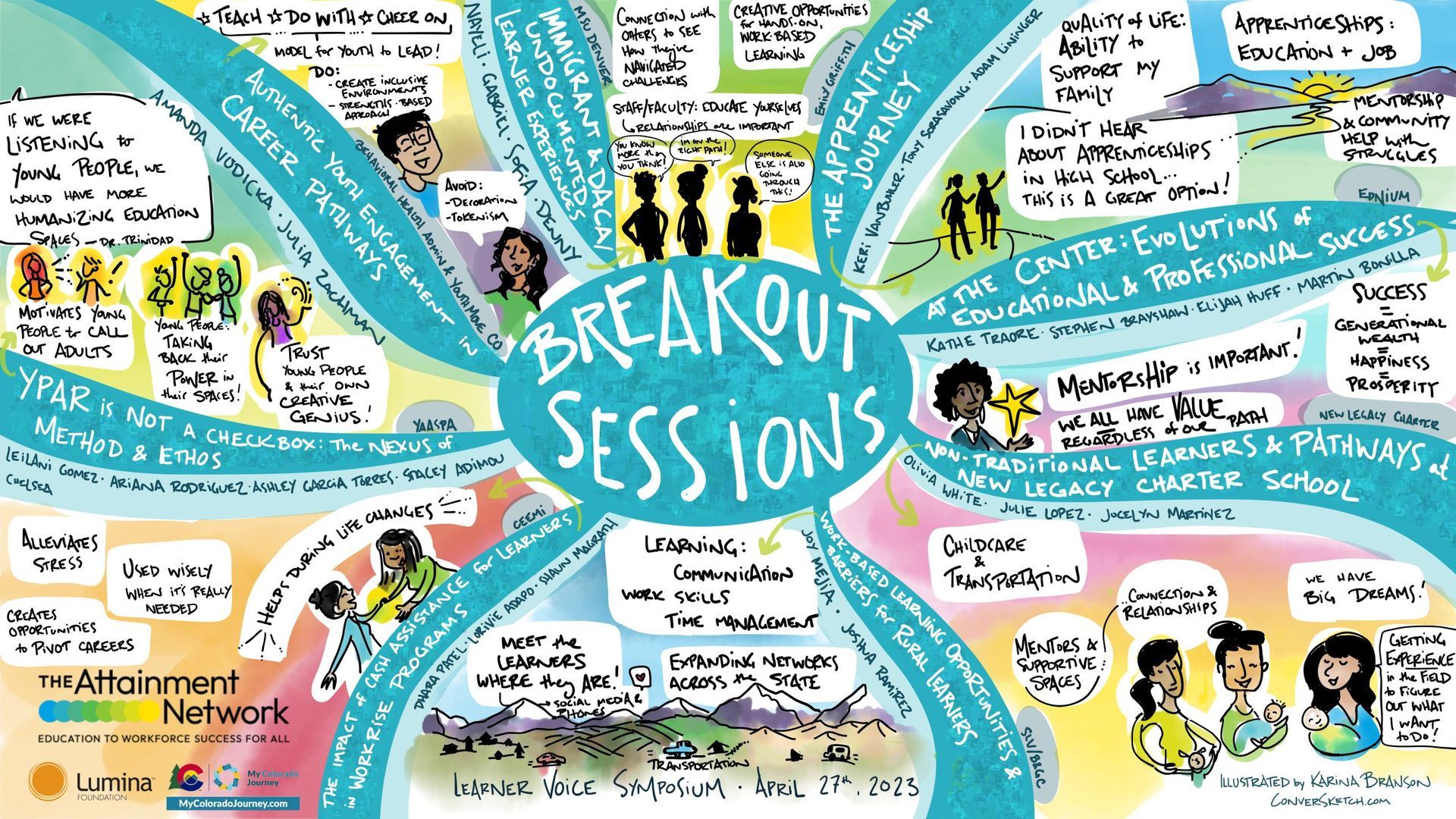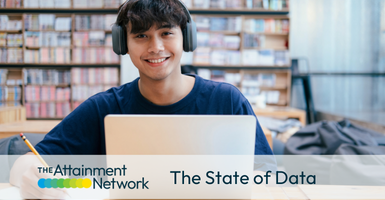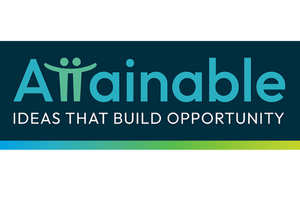Incorporating Learner Voice – Hearing from The Experts of Their Experience
IMportant insights from the 2023 Learner Voice Symposium

At The Attainment Network, we envision innovative education-to-workforce systems that develop a diverse and talented workforce. We believe in supporting learners and preparing them for future jobs, so they are able to meet economic demands and sustain thriving communities.
Prioritizing and sustaining focus on the learner’s experiences is a critical component of the work needed to erase persistent and pervasive equity gaps, expand opportunities for learners, and meet the economic demands for a highly skilled and educated workforce system of the future.
Our second annual symposium brought together an audience of educators, employers, and policymakers to hear directly from Colorado learners what they seek in career-connected pathways and how they define success.
The Symposium elevated insights from learners’ diverse experiences and backgrounds and provided actionable measures to improve and expand pathways for all learners.
Non-Traditional learners and pathway at New legacy Charter school
New Legacy Charter School (NLCS) enrolls and supports pregnant and parenting learners as well as their children in a unique two-generation setting. In addition to providing education for learners, New Legacy is rated in the top 5% of early learning centers in Colorado. High school learners at NLCS graduate at twice the rate of the national average for teen parents.
The panel of learners spoke about their experiences as learners and moms. All of the learner panelists have big dreams for their careers and personal lives, fueled by the individualized and supportive programming of NLCS. Learners have options to engage in concurrent enrollment and career exploration while at NLCS.
- Two of the largest challenges and concerns faced by learners are transportation and childcare. While in school NLCS learners have access to the early learning center for their children and -transportation is available as needed.
- Learners shared how valuable it is to have advisors and mentors; people to help them navigate different educational and workplace settings. Additionally, connecting with others who share similar life experiences has been supportive and motivating for the learners.
- Learning basic skills (i.e. essential or durable skills) like managing household finances, your credit rating or preparing a resume and cover letter are an important part of their high school education. Simple lessons make a big difference.
- Learners desire early connections with college advisors to create relationships to support transition to postsecondary.
- Parenting learners have big dreams for themselves and a deep desire to support their kids and make their families proud!
- Internships are a critical way to find out what you want to do without being lumbered with student loan debt: “I don’t think I would have figured out I wanted to be an ultra-sound tech, without actually getting to EXPERIENCE the field.”
At the Center: Evolutions of Educational & Professional Success by Ednium: The Alumni Collective
Ednium: The Alumni Collective hosted a panel of four alumni that discussed their experiences navigating through a school system whose definition of success was sometimes at a mismatch with their life outcomes. Despite this, they shared what made their unique experiences meaningful and how they were able to navigate these complex systems to achieve educational and professional success.
- Mentorship is important and valuable; some mentors reflected that they didn’t have similar supports along their journey and were vulnerable enough to admit that they really needed them. Regardless, it was important for them to be a mentor to future generations.
- The spaces that value you as a person, and make you feel comfortable the way you are, are the ones that drive the most success.
- Following the High School – College – Job path doesn’t exactly work as employers are often looking for work experience even for entry-level hires.
- From the learner perspective: Even if we didn’t go to high school, college, or have certain types of jobs, we still have VALUE.
- Success = generational wealth = happiness = prosperity
WORK-BASED LEARNING OPPORTUNITIES AND BARRIERS FOR RURAL LEARNERS WITH SAN LUIS VALLEY BOYS & Girls Club
San Luis Valley Boys & Girls Club hosted a panel with participants of a work-based learning program discussing the challenges and accomplishments while being in the program. B&GC/SLV provides candidates with meaningful career-focused learning experiences in a variety of fields. Program Directors connect learners with employers that are active in their fields throughout the San Luis Valley.
- The program helped improve essential/durable skills such as confidence, communication, work skills, and time management
- Learners recommend a stronger social media presence (e.g. TikTok) and texting to reach learners and help them understand the opportunities of work-based learning programs – meet the learners where they are!
- Create more activities in neighborhoods and communities to expose more learners to the program.
- Creating opportunities for learners to engage and expand networks and connect with other learners across the state would be exciting!
THE APPRENTICESHIP JOURNEY WITH EMILY GRIFFITH TECHNICAL COLLEGE
Emily Griffith Technical College (EGTC) shared details of apprenticeships and held a panel discussion with students about their experiences along their apprenticeship journeys. EGTC offers career and technical programs in health, skilled trades, information technology, service industries and business with partners across Colorado.
- High schoolers often aren’t presented apprenticeships as an option. Sharing the benefits of learning on the job, getting paid and low-no debt makes apprenticeships an attractive option. Include more types of hands-on learning in High School curriculum.
- Community support and mentorship in the program is an important aspect of its success, helping the learners overcome any obstacles and thrive in their role.
- The quality-of-life impact of apprenticeship programs can be huge, as well as the potential for improved confidence and creating an interest in learning where learners directly apply what they learn in the classroom to their job.
IMMIGRANT & DACA / UNDOCUMENT LEARNER EXPERIENCE WITH MSU DENVER
Learners from MSU Denver’s Immigrant Services Program shared their experiences navigating their education-to-career pathways. Having connections with others in the immigrant community as well as those with an understanding/awareness of relevant resources was a common theme of positive support. Some of the largest barriers to success for these learners included challenges related to limited access to resources, targeted information, financial aid, and particularly work-based learning opportunities based on their immigration status. Learners emphasized that it is not enough to just provide support in navigating the current system, but the system actually needs to change to meet their needs. As one student put it, “our ‘out of the ordinary’ stories are far too common to be perceived as exceptions to the rule.”
- Importance of relationships with advisors, faculty, and with other students to garner trust, connect to resources, and build a supportive community.
- Staff/faculty should do everything they can to be informed when working with DACA/Undocumented students. They need to educate themselves so they can provide information to learners about Financial Assistance, college & career processes, and what career opportunities can look like with various immigration statuses.
- Hands on/work-based learning opportunities need to be varied and creative. How students can and want to show up varies depending on their immigration status.
- Connecting to others in immigrant community is essential for learning how others have navigated similar challenges and what resources they’ve utilized.
THE IMPAct of cash assistant for learners in workrise programs with ceemi
Colorado Equitable Economic Mobility Initiative (CEEMI) created a program called Cash for Coloradans and Evidence for Equitable Upskilling. CEEMI is partnering with 3 organizations – Center for Employment Opportunities, CrossPurpose and ActivateWork – to pilot programs offering cash assistance to learners participating in upskilling opportunities and to conduct research into the impact of such programs on learner success.
- Cash assistance helps replace income when changing field, paying for a postsecondary pathway like a bootcamp or simply keeping a roof over your head.
- Alleviates the stress of financial uncertainty when you are trying to make a change.
- Don’t make assumptions; People who really need cash assistance to support their education and work goals will use it wisely.
- Creates a chance for someone to pivot and switch careers.
youth participatory action research (ypar) IS NOT A CHECKBOX: tHE NEXUS OF METHOD AND ETHOS WITH yAASPA
The organization Young Aspiring Americans for Social and Political Activism (YAASPA) recognizes the challenges youth face in navigating their academic, career, and civic development in the social sciences and public service careers in Colorado. YAASPA works to cultivate youth to be civically engaged in community and career by building the self-efficacy of youth. This session focused on Youth Participatory Action Research (YPAR) as a key approach to center learners and their experiences in the development of career pathways.
- YAASPA highlights that many of the decisions related to career pathways (e.g. which career pathways to develop and how) have been made from a top-down perspective, based on labor market demands in STEM, business, health, and other high demand fields. Consequently, there have been few endeavors to cultivate self-efficacy for youth who desire to pursue a social justice career and/or pursue degrees and careers in the social sciences. As Dr. Trinidad discussed during the symposium, “If we were listening to our young people, we would have more humanizing education spaces.”
- YAASPA tactically puts youth in positions of power as a means to cultivate agency and empowerment. The organization challenges us to “trust young people and their own creative genius.”
- Centering youth expertise in youth participatory action research (YPAR) provides the authority to youth “to call out the adults in their lives” and “take back power in their spaces.”
AUTHENTIC YOUTH ENGAGEMENT IN CAREER PATHWAYS HOSTED BY COLORADO BEHAVIORak health administration & youthmove co
Youth MOVE National is a youth-driven, chapter-based organization dedicated to uniting the voices of youth nationwide. Youth Move asserts that youth are the leaders of today, not tomorrow; all youth should be equal partners in the process of change; and that youth can motivate others through their voices of experience.
The YouthMove team talked about authentic youth engagement. When engaging youth, avoid tokenism and decoration to prevent burnout and hopelessness. Instead, create a more inclusive, empowering environment that continually addresses power dynamics.
- Cultivate environments where youth may more readily share their creativity, honesty and guidance
- Create inclusive environments where the youth feel a sense of belonging. Ensure the engagement is culturally responsive.
- Honor the understanding and expertise youth bring to your organization.
- Ask young people what they want out of their time with your organization or relationships with you. Be transparent and provide clarity.
- Maintain a strengths-based approach – seeing everyone’s superpower and honoring youth’s expertise and lived experience.
- Youth need a multitude of models such as: teach, do with, cheer on, for youth to lead in spaces.
RECENT ARTICLES



